

Skyler
Early Literacy - Apps on Google Play. "Early Literacy" provides different levels of literacy activities to help young children learn Chinese effectively, and master the literacy-related cognitive and perceptual skills, including oculomotor control & visual perception, phonological awareness, morphological awareness, orthographic awareness, pre-writing & writing skills.
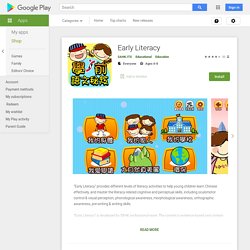
"Early Literacy" is developed by SAHK professional team. The content is evidence-based and context-based. The characters are chosen from the local curriculum. There are videos and interesting games to enhance children’s learning motivation. This upgraded app provides new functions including Augmented Reality (AR) game, dashboard for viewing learning progress, upload & download game data backup. "Early Literacy" can be used together with “The Early Literacy Learning Package 2” published by SAHK to make learning more comprehensive. Target population:1. Content and characteristics:There are 6 themes in the app, each theme contains 4 parts: 1. 2.
Ii. Top early literacy apps 2020. Most young children are already using apps on phones or tablets, at least occasionally.
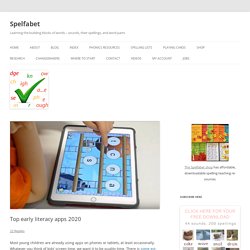
Whatever you think of kids’ screen time, we want it to be quality time. There is some evidence that interactive apps support early academic development, but finding quality early literacy apps can be difficult and time-consuming. Lots of what’s available is (IMHO) simply rubbish. It’s helpful to read adult reviews of apps for children, but a lot of online information is available about them already, and to REALLY road-test an app, I like to watch a young child using it. My colleague Caitlin Stephenson and I have thus filmed Harrison (aged 4, nearly 5) trying out some of my favourite early phonemic awareness and phonics iPad apps for young children. The resulting video is below. The only tablet I have is an iPad, but some of these apps are available for other platforms. Best Reading Apps for 1st Grade / 2020 Update. We Reviewed Dozens Of The Best Reading Apps for 1st Grade So You Don’t Have To.
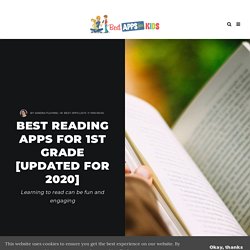
Here Are Our Top Picks. The early elementary years are a magical time! Kids are discovering the secrets of becoming literate, and there’s a lot you can do to help them in school. Here are some of the best apps to help your first grader along the road to reading, no matter what stage your child is at. The Best Reading Apps for 4- to 8-Year-Olds. No, they’re not a waste of time.
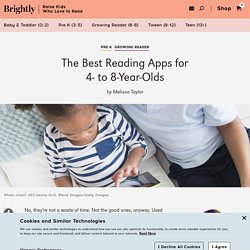
Not the good ones, anyway. Used judiciously, and as a complement to physical books, good reading apps can help kids learn to read and practice reading. And they’re convenient for busy families who want to encourage reading engagement on the go. “The advantage of using a device for reading is that it easily fits into modern families’ busy schedules so kids can read anywhere,” explains Beth Chang of iGameMom. There are many reading apps out there, though, and they’re not all created equal. 10 Of The Best Reading Apps For Kids In 2020. I recall my joy when I realized that I liked reading and I wanted more of it.
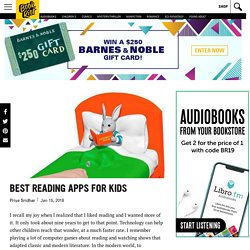
It only took about nine years to get to that point. Technology can help other children reach that wonder, at a much faster rate. I remember playing a lot of computer games about reading and watching shows that adapted classic and modern literature. 6 Great Reading Apps for Kids. In this swiftly changing techy era, it's tough to sort through what apps are must-have.
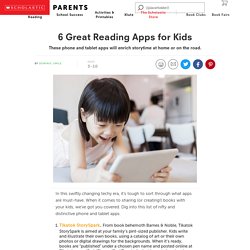
When it comes to sharing (or creating!) Books with your kids, we've got you covered. Dig into this list of nifty and distinctive phone and tablet apps. Tikatok StorySpark. From book behemoth Barnes & Noble, Tikatok StorySpark is aimed at your family’s pint-sized publisher. Reading Apps Archives - Best Apps For Kids. 5 Literacy Apps for Your Beginning Reader. "Mom, can I use the tablet?
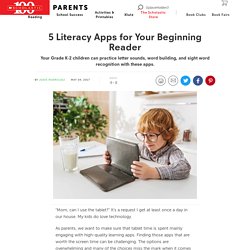
" It's a request I get at least once a day in our house. My kids do love technology. As parents, we want to make sure that tablet time is spent mainly engaging with high-quality learning apps. Finding those apps that are worth the screen time can be challenging. The options are overwhelming and many of the choices miss the mark when it comes to skill development. Assistive Technology for Reading. For people who struggle to read text, technology can be a lifeline.
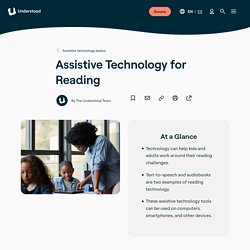
An audiobook, for example, allows them to experience a story they might not be able to access with a traditional book. Apps and Websites to Build Literacy Skills: Top Picks from Common Sense Education. Browse these Top Picks to discover the best in educational apps and websites that support core literacy skills — phonics, fluency, vocabulary, spelling, comprehension, and writing.
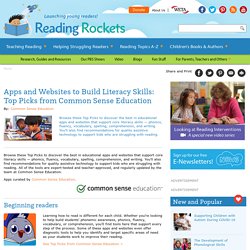
You'll also find recommendations for quality assistive technology to support kids who are struggling with reading. All of the tools are expert-tested and teacher-approved, and regularly updated by the team at Common Sense Education. By Danny Wagner, Common Sense Education Are you overwhelmed by the number of edtech tools available? Literacy Ideas for Beginning Readers. Beginning Readers: Digital Educational Resources. Technology and Media. Instructional Technology in Early Childhood ... Technology in early childhood education: Teaching early literacy with E-books. Introduction For students of all ages, the e-book is a compelling alternative to the print book.
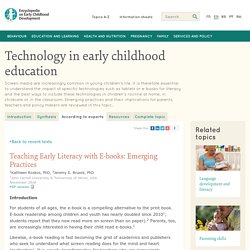
E-book readership among children and youth has nearly doubled since 20101; students report that they now read more on screen than on paper).2 Parents, too, are increasingly interested in having their child read e-books.1 Likewise, e-book reading is fast becoming the grist of academics and publishers who seek to understand what screen reading does for the mind and heart (motivation). It is equally transformative for teachers who are increasingly expected to integrate e-books into instruction, engage students in digital reading, and enable them to actively participate in a multimedia world.
This presents a new layer of complexities in an already challenging job. Subject The role of e-books in the teaching of reading is emerging. Problems. Technology that Supports Early Learning –Three Examples. Guiding Principles for Use of Technology with Early Learners. The thoughtful use of technology by parents and early educators can engage children in key skills such as play, self-expression, and computational thinking which will support later success across all academic disciplines and help maintain young children’s natural curiosity. The Departments recognize that families and early educators have many different options for using technology with early learners.
The Departments believe that guidance needs to reflect the reality that families and early educators have access to apps, digital books, games, video chatting software, and a multitude of other interactive technologies that can be used with young children. Even as new technologies emerge, the Departments believe that these principles apply, though guidance may evolve as more research on this topic is published. The Departments’ four guiding principles for use of technology with early learners are as follows: Guiding Principle #1: